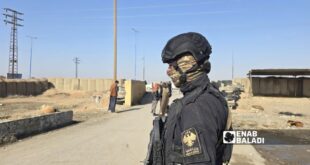(Reuters) – Rival Lebanese leaders reached a deal on Wednesday to resolve disputes over a new cabinet and a law for 2009 parliamentary elections, defusing a political crisis that has pushed the country to the brink of civil war.
Many of the differences at the heart of the crisis remain:
HEZBOLLAH’S WEAPONS, U.N. RESOLUTION 1559
Hezbollah’s arsenal has been at the heart of Lebanon’s political crisis. The group’s military routing of its rivals in the ruling coalition this month has amplified critics’ demands for an end to Hezbollah’s armed status.
The Shi’ite Muslim group, backed by Syria and Iran, was the only Lebanese faction permitted to keep its weapons after the 1975-1990 civil war so that it could fight Israeli forces occupying south Lebanon. Israel withdrew in 2000 and some Lebanese started to call for the group to disarm. More powerful than any other Lebanese faction, Hezbollah says it needs the weapons to defend Lebanon from Israel and will only consider giving them up as part of a national defense strategy. Critics say Hezbollah’s arsenal precludes the construction of a strong Lebanese state.
According to the Arab League-mediated deal that ended fighting among the factions this month, the issue will be discussed by the leaders in a dialogue chaired by a new president.
Previous talks on the issue collapsed in 2006.
U.N. Security Council resolution 1559 issued in 2004 called for the disarmament of all militias in the country — a clear reference to Hezbollah.
RELATIONS WITH SYRIA
The new president and government face the challenge of improving official ties with Damascus, which saw the previous cabinet as hostile. Syria dominated Lebanon until 2005 when it was forced to withdraw its troops after the assassination of former Prime Minister Rafik al-Hariri. Damascus has no diplomatic relations with Lebanon and has shrugged off calls from Western states to open an embassy in Beirut.
The coalition which won parliamentary elections after the Syrian withdrawal opposes Syrian influence in Lebanon. Led by Hariri’s son Saad, the bloc accuses Damascus of killing anti-Syrian figures and smuggling weapons across the border to destabilize the country. Syria denies the accusations.
Hezbollah and the Amal movement, led by Parliament Speaker Nabih Berri, have strong links to Damascus.
SECURITY
Lebanon’s security forces have struggled to control security in the country since Syria withdrew in 2005. There have been ten assassinations, numerous bomb attacks and an insurrection by Islamist militants in the north.
The army crushed an uprising by Islamist militants in the Nahr al-Bared Palestinian refugee camp this year, but lost 169 soldiers. The camps, controlled by Palestinian factions, remain mostly off limits to the state.
U.N SECURITY COUNCIL RESOLUTION 1701
Adopted on August 11, 2006, the resolution ended a 34-day war between Israel and Hezbollah. It resulted in the deployment of some 15,000 Lebanese troops and thousands of new U.N. peacekeepers in the south, which had previously been controlled solely by the Shi’ite group. The resolution called for a cessation of hostilities. But a permanent ceasefire has yet to be concluded between Lebanon and Israel.
Challenges to the resolution include repeated Israeli overflights, a rocket attack by suspected Palestinian guerrillas into Israel and two attacks on U.N. peacekeepers, one of which killed six members of the force known as UNIFIL.
The Security Council also voiced concern at reports from the Lebanese and Israeli governments of arms from Syria reaching Hezbollah and Palestinian guerrilla groups.
HARIRI TRIBUNAL
The United Nations is establishing an international tribunal to try suspects in the February 14, 2005 killing of Hariri and other attacks on anti-Syrian figures in Lebanon. The Security Council voted in May 2007 to set up the tribunal. The Lebanese state never fully approved plans for the court, which is one of the core areas of dispute between pro- and anti-Syrian factions.
ECONOMY
The political crisis, assassinations, the Nahr al-Bared battle and the 34-day war with Israel have all weighed on Lebanon’s debt-laden economy, which stood still in 2006 but registered growth of around 4 percent in 2007. The outgoing cabinet has committed to privatizing two mobile phone networks. Proceeds from the sale will go toward paying off maturing debt.
The new government will also face the challenge of implementing long-stalled energy sector reforms.
 Eurasia Press & News
Eurasia Press & News



